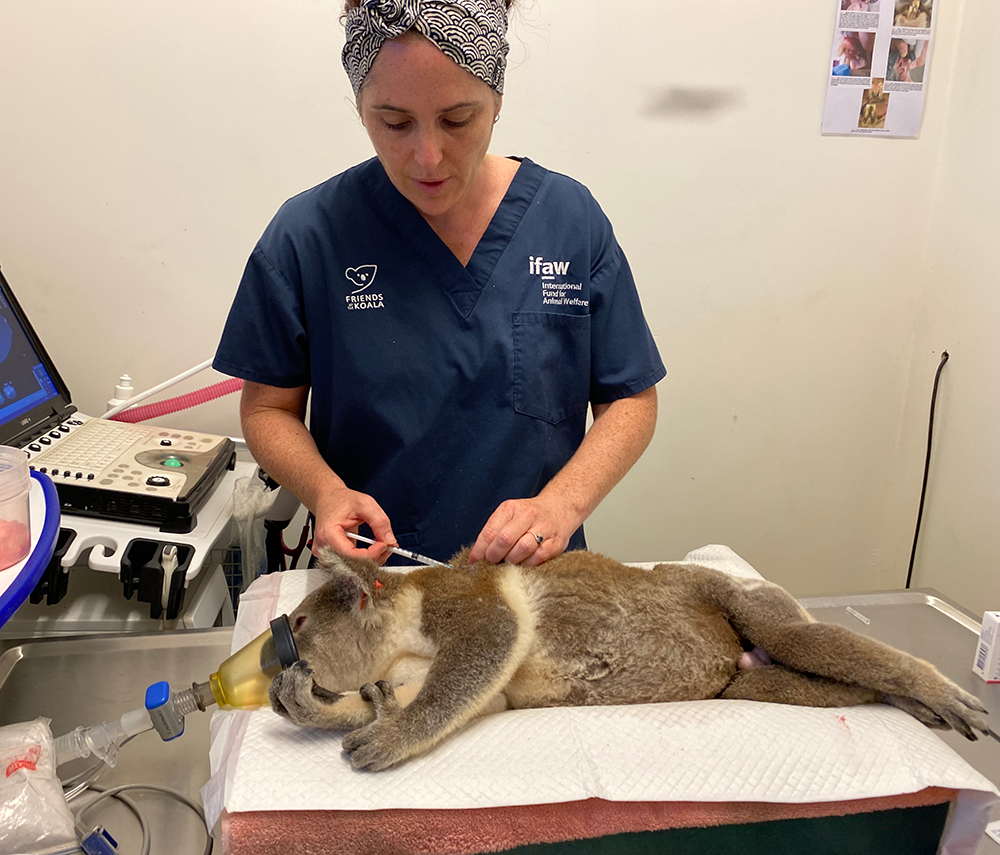Koala Research Projects
As we admit around 350 koalas through the hospital each year, Friends of the Koala is uniquely placed to make significant contributions in support of research projects and training programs being undertaken by other institutions.
It is through collaboration of this type that we ultimately save the species. Through research, our number one goal is to prevent disease and injury in koalas and thereby reduce the number of patients needing veterinary care at the Koala Hospital.
Koala Chlamydia
Koala chlamydia is the number one cause of death for koalas in our region. Therefore, our main research focus in the hospital has centred on projects that will allow us to utilise chlamydia vaccinations that are currently under development. At present, we are involved in two koala chlamydia vaccine research trials with Professor Peter Timms and Dr Samuel Phillips from the University of Sunshine Coast.
The first project involves capturing, assessing and vaccinating a wild population of koalas in the Ruthven region and we commenced vaccinating koalas for this study in March 2023. The second project will allow us to vaccinate 100 koalas per year for three years through our Koala Hospital and we are hoping to begin this project in August 2023.
Since February 2022, we have also been part of a vaccination research project with Dr Michael Pyne from Currumbin Wildlife Hospital using another vaccine developed by Professor Ken Beagley at the Queensland University of Technology. Being part of this vaccination project requires transportation of the koalas up to Pottsville which is only possible thanks to the dedication of our volunteers who have to make the three hour round trip.
Read more about Chlamydia in koalas and how you can help to protect them here.
In other research news, we are busily collecting samples for various koala research and training projects. Some examples include:
-
University of the Sunshine Coast (Professor Peter Timms and Dr Samuel Phillips)
DNA swabs for Koala Chlamydia pecorum genomics looking at tailoring vaccines to specific chlamydial strains in our region.
-
University of Sydney (Dr Merran Govendir)
We send blood samples from healthy and diseased koalas to study their immune systems response to inflammation.
-
University of Queensland (Dr Edward Narayan)
Fur and Scat samples from joeys will be studied to assess their responses to stress when in care.
-
University of Sydney
We provide DNA samples for koala genomic studies from every koala admitted to FOK Hospital.
-
Taronga Zoo
Koala cadavers from FOK are used for their veterinary koala education workshops.

RESEARCH & DIAGNOSTICS LABORATORY
Koala DATABASE
The Friends of the Koala Database, dating back to 1989 and one of the largest single-species databases in the world, is incredibly important for koala conservation. It provides invaluable insights into koala population trends and changes.
The database is continuously updated from initial calls to hotline operators, through clinical staff and volunteers. It includes records of rescued koalas and sightings reported by community members, providing a comprehensive understanding of koalas' movements in their habitat and long-term outcomes.
This data is pivotal in responding to development applications potentially affecting koala colonies and habitats by offering quantitative evidence of koala populations in specific areas.

